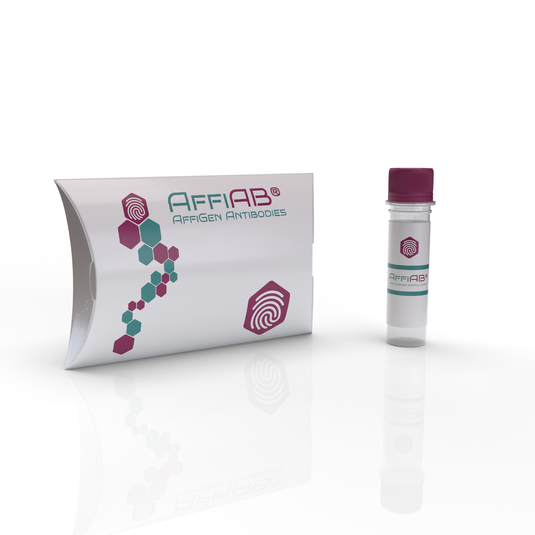AffiAB® Goat Anti-CDH1 Polyclonal IgG Antibody
Our Goat Anti-CDH1 Polyclonal IgG Antibody is created to recognize the epitope of the human E-cadherin 1. Its specificity and affinity make it an excellent choice for research purposes.
Host: Goat
Species: Human
Description: Goat anti-CDH1 Polyclonal IgG Antibody is an antibody that specifically binds to the CDH1 protein, also known as E-cadherin. CDH1 is a calcium-dependent cell adhesion molecule that plays a crucial role in maintaining the integrity of epithelial tissues by mediating cell-cell adhesion. Dysfunction or loss of CDH1 expression has been associated with various cancers, including breast, prostate, and gastric cancer. The Goat anti-CDH1 Polyclonal IgG Antibody is commonly used in research to study CDH1 expression and function in normal and pathological conditions.
Gene Identifier/Accession Number: ENSG00000039068
Form: N/A
Concentration: 2 mg/mL
Type: Primary
Clonality: Polyclonal
Isotype: IgG
Conjugation: Unconjugated
Application: Western Blot, Immunofluorescence, Immunohistochemistry PARAFFIN PROTOCOL , Immunohistochemistry FROZEN
Storage: For continuous use, store at 2-8 C for one-two days. For extended storage, store in -20 C freezer. Working dilution samples should be discarded if not used within 12 hours.
Special instructions: The antibody solution should be gently mixed before use.
Goat Anti-CDH1 Polyclonal IgG Antibody
Cell adhesion is a fundamental process that plays a pivotal role in various biological phenomena, including embryogenesis, tissue maintenance, and immune response modulation. Cadherin-1 (CDH1), also known as E-cadherin, is a critical cell adhesion molecule that functions as a central player in adherens junctions, contributing to tissue integrity and cellular signaling. In the realm of scientific research, the Goat Anti-CDH1 Polyclonal IgG Antibody has emerged as a versatile and indispensable tool for exploring the roles and functions of CDH1 in cellular processes.
Understanding CDH1 (E-cadherin)
CDH1 is a calcium-dependent transmembrane glycoprotein belonging to the cadherin superfamily. It is predominantly expressed in epithelial tissues and functions as a key mediator of cell-cell adhesion. Through homophilic interactions, CDH1 molecules on adjacent cells bind together, forming adherens junctions that provide structural support and promote tissue integrity. Additionally, CDH1 is involved in various intracellular signaling pathways, influencing processes such as cell proliferation, migration, and differentiation.
The Goat Anti-CDH1 Polyclonal IgG Antibody: A Versatile Research Tool
The Goat Anti-CDH1 Polyclonal IgG Antibody is an antibody specifically designed to target CDH1 proteins. This antibody is generated by immunizing goats with purified CDH1, resulting in a polyclonal mixture of immunoglobulins G (IgG) that can recognize multiple epitopes on the CDH1 molecule. Its polyclonal nature enhances its versatility, making it an invaluable asset in a wide array of experimental applications.
Applications of Goat Anti-CDH1 Polyclonal IgG Antibody
Immunofluorescence (IF) and Immunohistochemistry (IHC):
Researchers employ this antibody in IF and IHC experiments to visualize the subcellular localization of CDH1 within cells and tissues. These techniques enable the assessment of changes in CDH1 expression and distribution under various experimental conditions.
Western Blotting:
The antibody is used in Western blot assays to quantify CDH1 protein levels in cell lysates or tissue extracts. This application is instrumental in studying CDH1 expression changes in response to different biological stimuli.
Co-immunoprecipitation (Co-IP):
Scientists utilize this antibody in Co-IP assays to isolate CDH1-associated protein complexes, shedding light on its interactions with other molecules and its involvement in specific cellular processes.
Functional Studies:
The Goat Anti-CDH1 Polyclonal IgG Antibody can be applied in functional assays to investigate the impact of CDH1 modulation on cell adhesion, migration, and invasion, providing insights into its roles in development and disease.
Disease Research:
Dysregulation of CDH1 is implicated in various diseases, including cancer metastasis and developmental disorders. Researchers utilize this antibody to explore the underlying mechanisms and potential therapeutic targets associated with CDH1-related pathologies.
Conclusion
The Goat Anti-CDH1 Polyclonal IgG Antibody has become an invaluable asset in cell adhesion and related research. Its specificity, versatility, and reliability make it an indispensable tool for investigating the roles of CDH1 in tissue development, homeostasis, and disease. As scientists continue to delve deeper into the complexities of cell adhesion and signaling, this antibody remains a trusted companion in their quest for knowledge and scientific breakthroughs.

